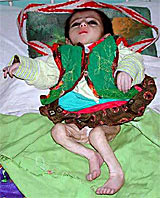|
World
Afghanistan's Poor Face a Looming Crisis
 See pictures from Afghanistan after the Sept. 11 terror attacks in New York and Washington, D.C. See pictures from Afghanistan after the Sept. 11 terror attacks in New York and Washington, D.C.
 | |
A woman with her child at a hospital in Kabul, Sept. 22.
Photo: REUTERS
|
Sept. 24, 2001 -- Millions of Afghanis depend on international aid for survival, in a country wracked by civil strife and periodic drought. But the delivery of that aid was thrown into doubt when Afghanistan's ruling Taliban regime rejected the U.S. ultimatum to hand over suspected terrorist mastermind Osama bin Laden and the members of his group, al Qaeda.
The United States is the biggest aid provider to Afghanistan's poor. Despite the Sept. 11 attacks, the United States said Sept. 21 that it would honor a commitment (made earlier this year) to donate 100,000 tons of wheat to Afghanistan's needy. But under the current situation, delivering the aid will not be possible, said Mohamed Zejjari, director of operations of the U.N. World Food Programme.
Aid agencies say food, medicine, and other essential supplies could run out in Afghanistan within one month, as Pakistan and Iran seal their borders and the U.N. and other non-governmental organizations withdraw their foreign aid staff.
 | |
A malnourished baby at an Afghan hospital, Sept. 22.
Photo: REUTERS
|
Some 6 million Afghanis are threatened by food shortages, and at least 1 million could face starvation if the World Food Programme cannot return its evacuated staff to the country and resume normal operations there, a spokesman said.
Other Resources
• Learn more about Afghanistan's looming food crisis from the U.N. World Food
Programme, the world's biggest food aid agency.
|